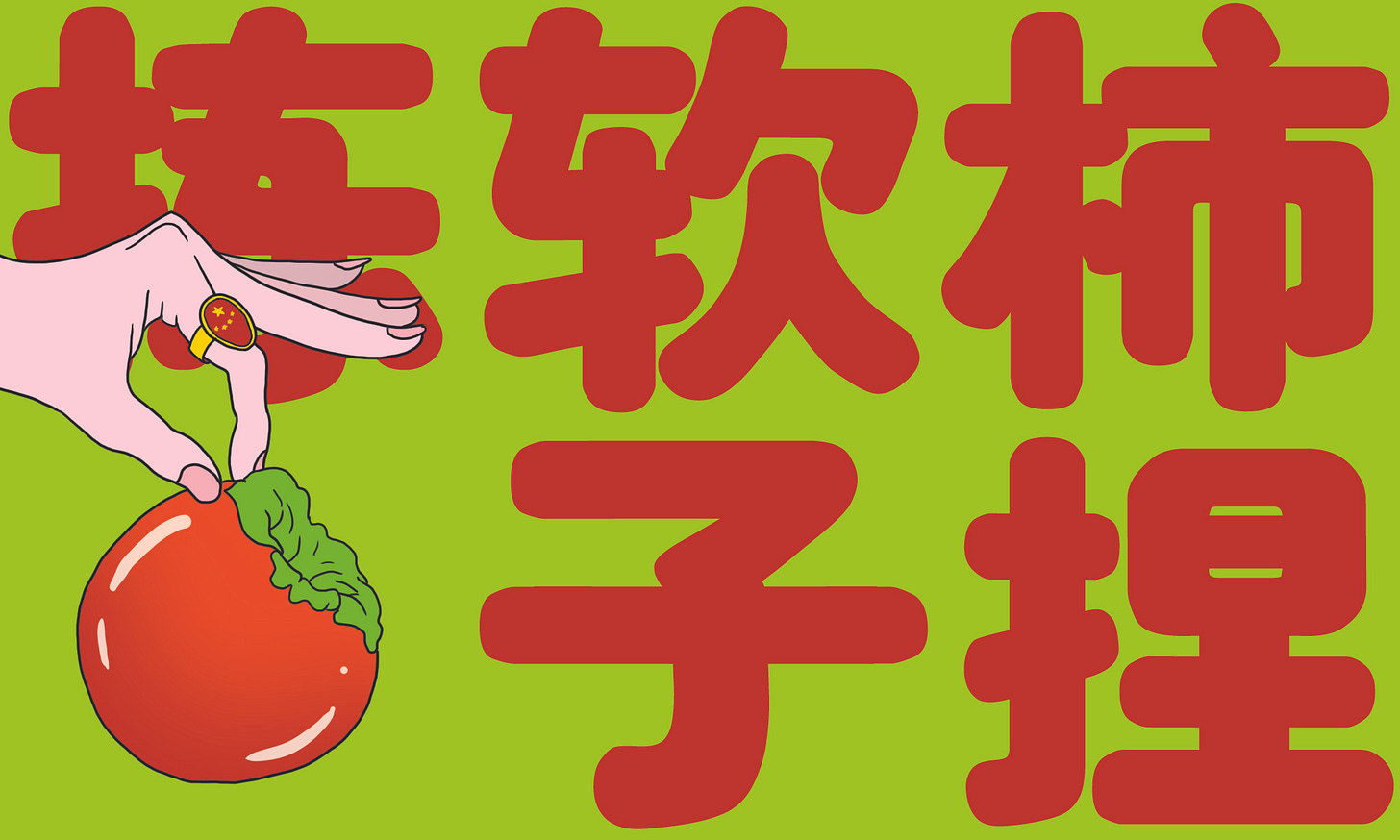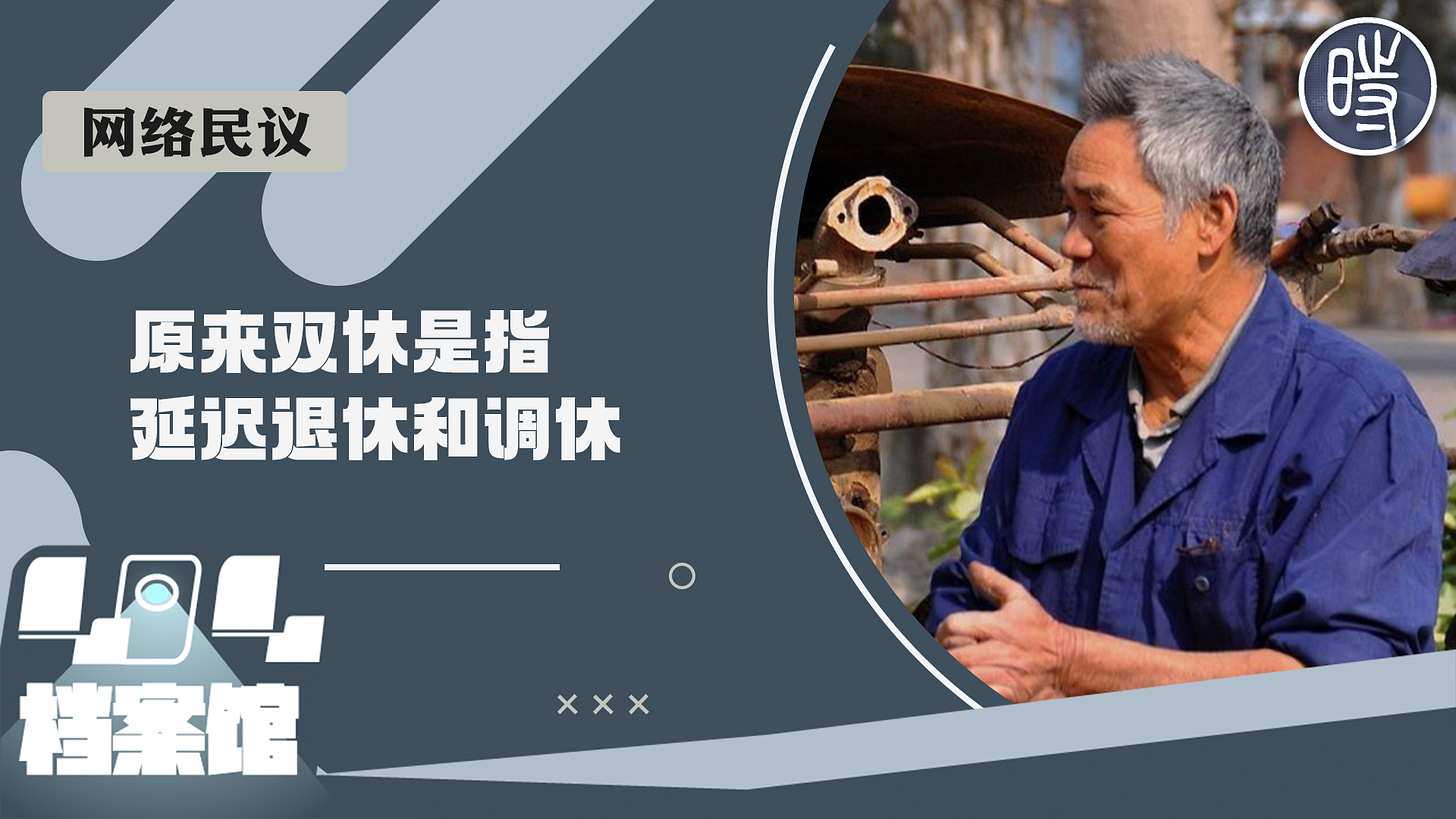Welcome to RealTime Mandarin—a multimedia resource to immerse you in the latest Chinese language trends, inspire you to practice and improve your Mandarin every week, and empower you to communicate with confidence.
Subscribe now to get the next issue straight to your inbox!
China has one of the lowest retirement ages in the world.
For over a decade, the government has talked about raising it to address two major challenges: an ageing population and a shrinking pension fund. However, after years of debate and indecision, no action was taken—until last week.
On September 13, the National People’s Congress Standing Committee (中国全国人大会常务委员会), China's highest legislative body, approved a long-awaited increase in the official retirement age.
The retirement age for men will increase from 60 to 63. For women, the current retirement age of 50 for blue collar workers will rise to 55, and for civil servants, the age will be raised from 55 to 58.
These reforms will be phased over the next 15 years.
Wáng Xiǎopíng 王晓萍, Minister of Human Resources and Social Security, explained in a press conference that the adjustments will be "gradual" (渐进式) and "flexible" (弹性) giving soon-to-be retired workers options depending on what they want to do.
Wang further emphasised:
One of the characteristics of this plan is that it takes small, gradual steps.
该方案的特点之一是坚持小步调整,逐步到位。 [4].
But that was not enough to stop the significant criticism of the policy online, with hundreds of comments appearing in response to the Xinhua announcement about the policy.
One reader vented their frustration, saying:
"With a tough job market and many young people struggling to find work, now they want to delay the retirement of the elderly!
Isn’t this just lazy governance?"
"就业形势严峻,大批年轻人找不到工作,现在还非逮着一群老头老太太延迟退休!这不就是用屁股想出来的乱政吗?" [2].
Another, obviously of a certain pedigree, put it more bluntly in beautiful Chinese:
When I was born, they complained I was one of too many; when I gave birth, they complained that I didn't bear enough children; when looking for a job, they complained I was too old; when retiring, they complain I'm too young.
生我时嫌我多,我生时嫌我少,找工作嫌我老,等退休嫌我小。
And another comment further points to frustration of ageism in China's job market:
On one hand, I am worrying about being laid off at 35, and on the other, I'm concerned about still being a lowly worker at 65.
Life is really tough, so bitter.
一边担心35岁被裁员,一边担心65还在当一个马喽,好苦啊,人生真的好苦
There’s plenty more of these comments in our links section at the end, archived by the amazing China Digital Times.
But online discussions were quickly censored, and comments like these were removed.
And articles published on WeChat public accounts were taken down resulting in “404 Not Found” error messages.
It wasn’t just recent posts that were removed; the censorship machine went back in time too.
An article from more than 10 years ago, Delaying Retirement Could Be a Breach of Trust for a Generation (延迟退休可能是对一代人的违约), by Cáo Lín 曹林, published in China Youth Daily on 20 April 2013, was also deleted.
Cao Lin is a well known state media journalist. He was an editor and chief commentator at China Youth Daily, and is now a professor of journalism.
The sentiment Cao expresses in his 2013 article still resonates with the criticism of the actual policy announced this week, leaving many feeling that their concerns about fairness and equality are being ignored:
What people are against is not the government raising the retirement age; rather, they are more frustrated by its disregard for public opinion on the “dual-track pension” reform.
Since the interests of officials and experts cannot be touched, the government is picking on the weak.
人们其实不是反对延迟退休,而更多是反感政府在双轨制改革上对民意的漠视,动不了官员和专家,就拣软柿子捏。
The "dual-track pension system" (双轨制) means there is one pension for government employees and other public sector workers, and another for private sector employees.
Public sector pensions are generally more generous than for private sector employees.
Critics have long argued that the focus of reforms should be on unifying the “dual track” pensions into one, before altering retirement ages:
"The public’s biggest expectation is to unify the pension system to ensure equality for all citizens first, then address the deficit issue."
"公众最大的期待是养老双轨制的并轨,把每个国民一起置于平等的体制下,先解决平等问题,再解决空账问题。" [3].
The new policy does not address these concerns.
Another criticism levelled by Cao Lin over ten years ago, which is also still relevant to concerns being vented this week, is how officials and experts support the increase in retirement age because it extends their careers, power, and influence.
This contrasts sharply with ordinary workers, who see the extension as an added burden rather than a benefit:
Most officials hope for a delayed retirement because it not only extends their career but also expands their political power.
官员大多希望延迟退休,因为延迟的不仅是工作,更是权力利益。
But something does need to be done in response to the demographic challenges faced by China.
According to the IMF, China will see a decrease of 170 million working-age people and a sharp increase in the elderly population over the next 30 years.
Additionally, data from China’s Ministry of Finance indicates that 11 out of China’s 31 provinces are dealing with pension budget deficits, or "empty accounts" (空账) in Chinese. Without substantial reforms, the data suggests the pension system may face a funding shortfall by 2035.
While the new retirement age policy seeks to address these challenges, it does not confront the fundamental issue of pension system inequality directly, according to its critics.
So, that's what we're exploring this week!
🎧 Podcast Preview: This week in the Member Podcast, we dive into why raising the retirement age is such a sensitive topic in Chinese, and break down the subtle differences between various ways to say “deficit” in Mandarin: 赤字 (chìzì), 缺钱 (quēqián), 缺口 (quēkǒu), 亏空 (kuīkōng), and 空账 (kōngzhàng). Curious about when to use each? Tune in for a full breakdown and boost your Mandarin skills!
Favourite Five
1. 空账 kōng zhàng
empty account, deficit
即使因为空账问题需要调整,也应经过民主决策 - Even if adjustments are needed due to pension deficits, they should be made through democratic decision-making. [3]
2. 锱铢必较 zī zhū bì jiào
nit-pick, argue over every penny
与其锱铢必较退休金亏空问题,还不如加大力度给出措施降低年轻人失业问题吧 - Instead of trying to find every penny for the depleting pension pot, it’s better to focus on measures to reduce youth unemployment. [2]
3. 拣软柿子捏 jiǎn ruǎn shì zi niē
pick on the weak
动不了官员和专家,就拣软柿子捏 - Since they can't touch the interests of officials and experts, they just pick on the weak. [3]
More: Read more about this phrase, a Chinese pun, in Sinica Phrase of the Week tomorrow.
4. 温水煮青蛙 wēn shuǐ zhǔ qīng wā
boiling frog syndrome; slow and unnoticed danger
很多网民对此并不买账,认为该决定是"温水煮青蛙"的试探 - Many netizens are not buying it, believing this decision is the first step in "boiling a frog in warm water". [4]
5. 不患寡而患不均 bú huàn guǎ ér huàn bù jūn
what people worry about is not scarcity but inequality
人们不患寡而患不均,养老账户的空账问题虽然严重,但他们可以接受一个低的养老金 - What people worry about is not scarcity but inequality. The pension account deficit is serious, but they can accept a lower pension. [3]
Note: From the Analects of Confucius (论语). This phrase explains that for a country, it is not necessary to worry about having insufficient land, wealth, or population. Instead, the concern should be about social inequality and the lack of peace and stability in people's lives.
Consuming the Conversations
6. 熬 áo
to endure
辛辛苦苦熬了一辈子好不容易熬到了退休 - After enduring a lifetime of hard work, I finally made it to retirement. [3]
7. 撕裂 sī liè
to tear apart
这是一个容易撕裂社会情感的话题 - This is a very divisive and emotional topic.[3]
8. 剥夺 bō duó
to deprive
反对者则多是相对被剥夺群体,甚至是受损者 - Opponents are mostly from those who will be disadvantaged by the proposal, or even those whose interest will be harmed. [3]
9. 漠视 mò shì
to ignore, to be indifferent
反感政府在双轨制改革上对民意的漠视 - There is resentment towards the government’s indifference to public opinion on the dual-track reform. [3]
10. 赤字 chì zì
deficit
全国31个省级行政区中,有11个面临养老金预算赤字 - Out of the 31 provincial-level administrative regions in the country, 11 are facing pension budget deficits.[4]
Three-character phrases
11. 夕阳红 xī yáng hóng
sunset glow; later years of life
对于一些从事繁重体力劳动的人,“夕阳红”等生命意义叙事显得太奢侈了 - For some people engaged in strenuous physical labor, the idea of enjoying life in old age seems like a luxury. [1]
12. 渐进式 jiàn jìn shì
gradual, progressive
关于实施渐进式延迟法定退休年龄的决定 - The decision to implement a gradual delay in the statutory retirement age. [2]
Related:
阶梯式 jiē tī shì - staggered, tiered
13. 落寞感 luò mò gǎn
sense of loneliness, desolation















